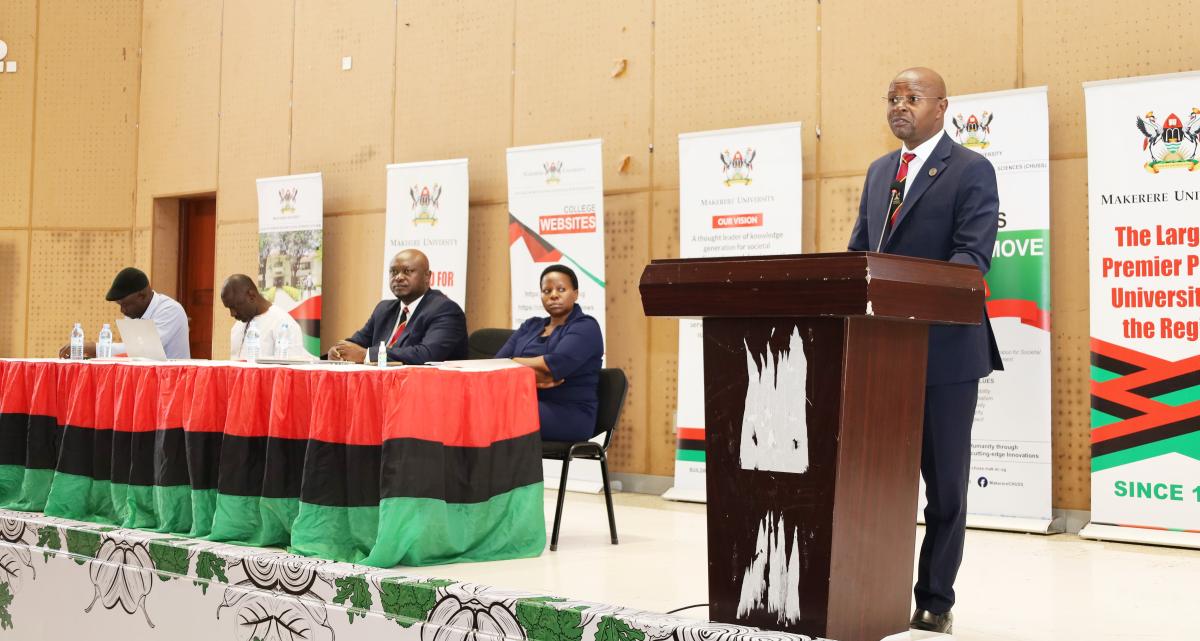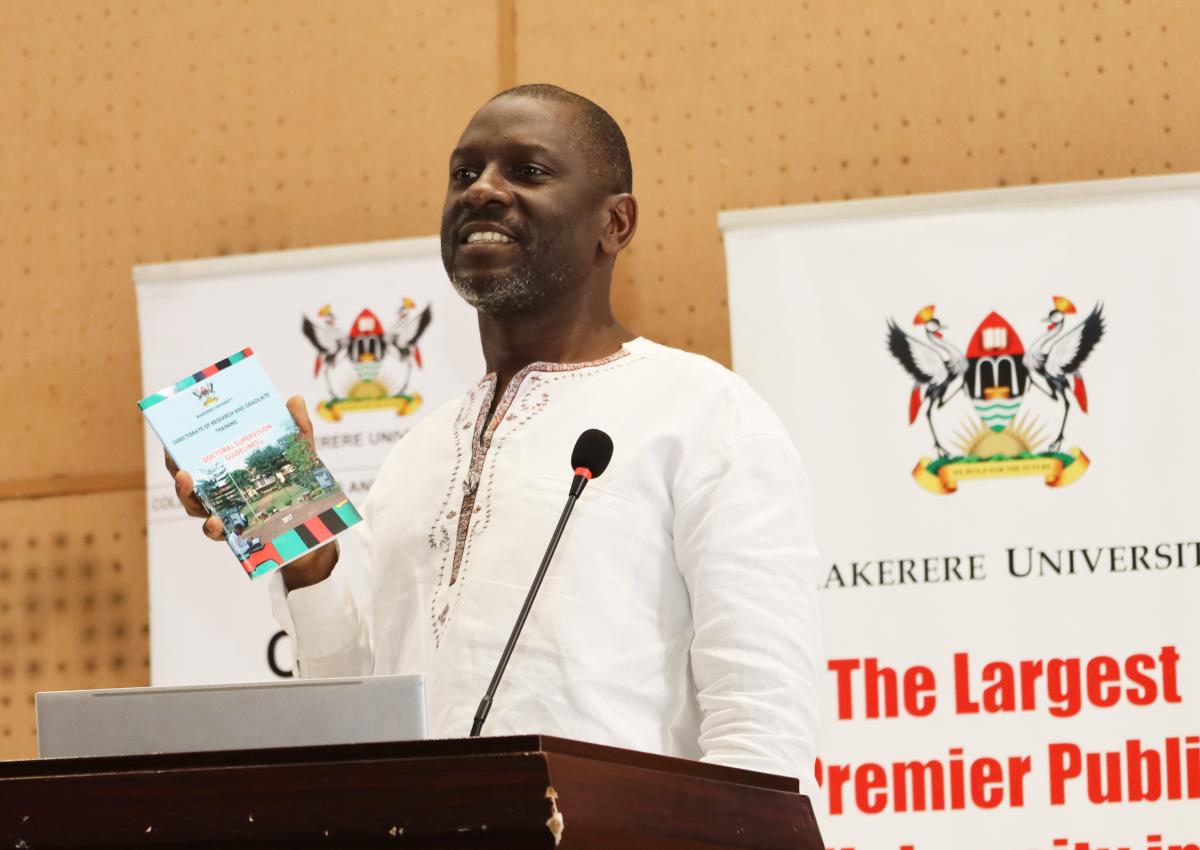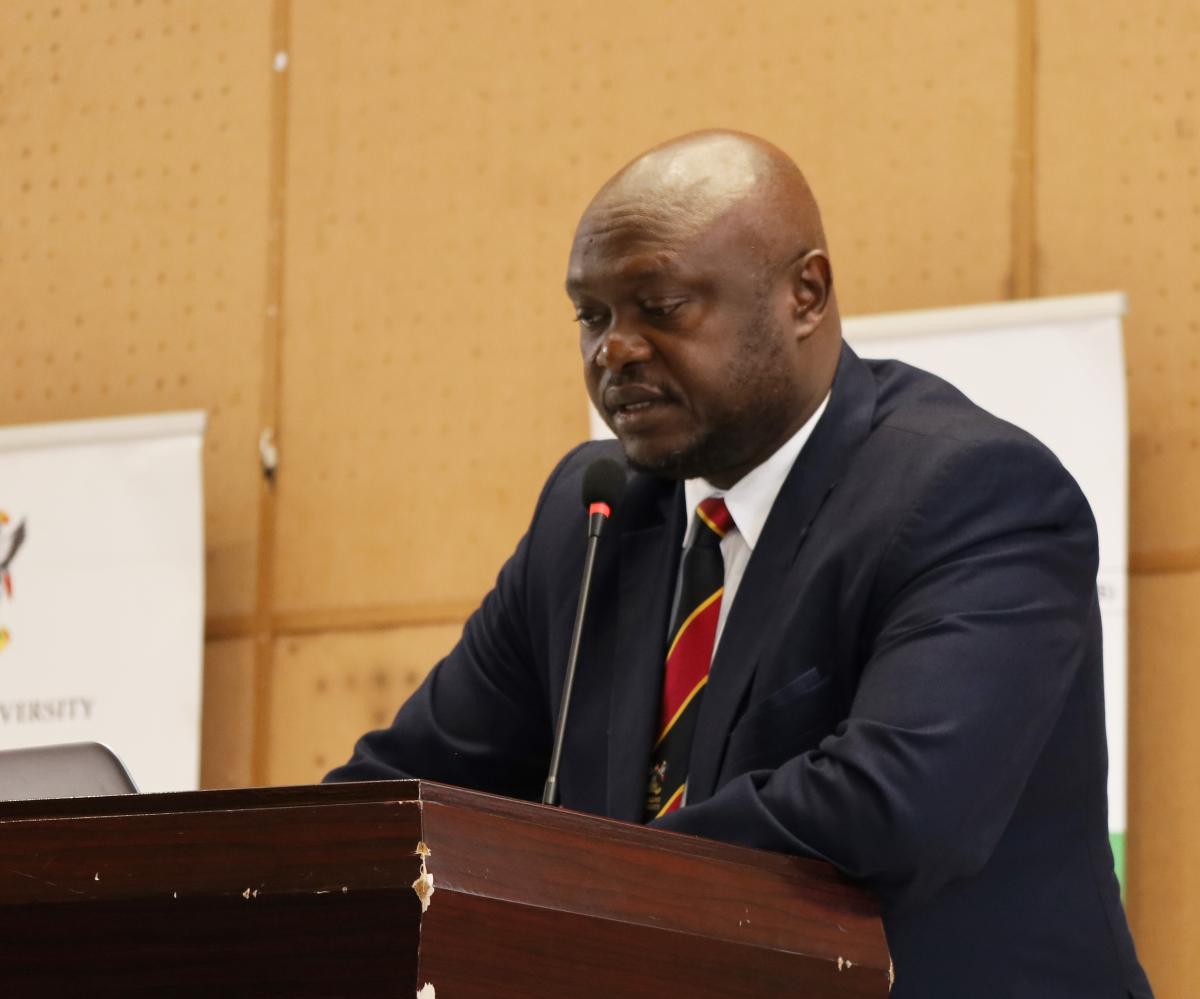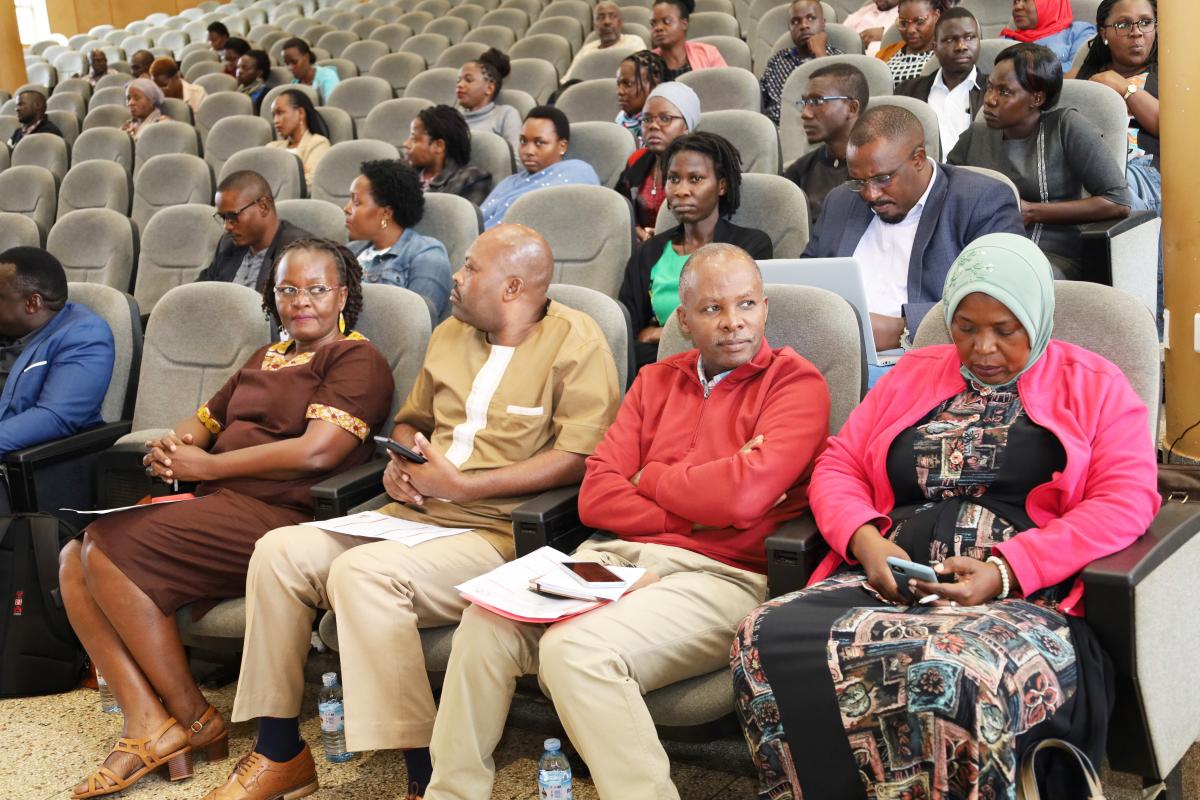
The Directorate of Graduate Research and Training (DGRT) and the Management of the College of Humanities and Social Sciences (CHUSS) have reassured Graduate students and staff that they will improve the environment for Graduate Studies at Makerere University.
The assurance was made during the CHUSS Graduate Annual meeting that was held on 26th April 2023 in Yusuf Lule Auditorium. The workshop was organized by the CHUSS Graduate Coordination Office headed by Dr. Zaid Ssekito.
The purpose was to take graduate students through what is required of them, the status and future of graduate training at Makerere and the general university policies that guide graduate studies at Makerere.
It also served as a platform for students, supervisors, coordinators and management to interact and share their experiences , opportunities and challenges along their graduate journey at Makerere and collectively get feedback and offer solutions. The college was also cognizant that due to CoVID, a significant number of students and specifically the international students could have missed the orientation exercise hence the need for this meeting to induct them.

The meeting was graced by Director Directorate of Graduate Research and Training Prof. Edward Bbaale who presented on the Status of Graduate Training at Makerere University. The Deputy Director, Graduate Training and Research Assoc. Prof. Julius Kikooma presented on the General Policies Governing Graduate Training at Makerere University.
The meeting was also attended by the Head of ICT in the Academic Registrars’ Department Dr. Mike Barongo who presented on ICT and Graduate Training at Makerere University and the Senior Assistant Registrar DGRT Ms. Prossy Nakayiki who presented on Graduate Registration Process, Requirements and Policies. Staff, Heads of Departments , Deans and coordinators form CHUSS also attended.
The workshop ended with a session on Graduate Student’s Experiences and Challenges at CHUSS- Makerere University. Issues raised ranged from supervision for example, the workload, who supervises the supervisors, facilitation for supervisors and conflicts among co-supervisors. Administrative challenges relating to accommodation, clearance and IDS were voiced. Student related issues included financial stress, relationships and broad health issues including mental health. Others were tracking students’ progress, improving communication with students and the need for the university to define the PhD by Research with specific attachment to field of study and streamlining the research agenda in line with national and societal needs.
We shall remove any pothole on the road to graduate training-DGRT
The Deputy Director, Graduate Training and Research Assoc. Prof. Julius Kikooma described the meeting as a forum where university stakeholders collectively work towards solutions to the problems both as students but also as teachers, the supervisors and program administrators
Prof. Kikooma described the students concerns as feed back in good faith not matter the expression on grounds that it was coming from where there is pain which requires a solution.

“Personally I have taken it positively that you want improvement and improvements we shall offer at least that is the commitment we can offer as DGRT. Whether that improvement is how we deal with online application so we are able to be responsive.
Those that are interested to come to us, we commit to remove the potholes. Graduate training roads must be freed of any potholes if the mantra of research-led is to be actualized.
As DGRT, we are going to employ all ways that we can to be able to be In the face of the students, to be in the face of the supervisors and also to be in the face of the teachers who teach graduate students”, Kikooma pledged.
Prof. Kikooma promised that graduate school will employ technology , digital systems and come up with quick information guides to improve the way they put information out there , the way people know what they offer as a commitment that plays to the realities on ground today .
Acknowledging the good brand of Makerere university Kikooma cautioned about complacency on reason that this brand cannot be forever with so many institutions that have come up and therefore the need for the university to up to game.
Kikooma urged students to read the Graduate Handbook 2013 which has clauses on how supervision and issues of conflict should be handled which also extend to students. He advised that irrespective of whether they are friends or not, what binds them with the supervisor is that they must complete their project.
Acknowledging that there are challenges in terms of available staff for supervision , Kikooma said as DGRT through the handbook, gives a guideline on how many PhD/Mater students a supervisor should have a at any one time as a matter of workload.
He however noted that while the supervisors may genuinely have many students , some of the workload is created by people who are stuck in the system. DGRT will do what is possible to remove any environment that makes people get stuck because of policy and so on, but students also will have to do their part by paying attention to the basics from day one to the last, keeping eyes on the ball and here the ball is only one;- for the PhD , the need for the thesis out of the way and for the masters students, the need to complete all the course works on the curriculum and the thesis.
Prof. Kikooma clarified that although CoVID disrupted orientation for graduate students, the normal modus operandi for induction is that every new group must be inducted and graduate school together with colleges must provide time at the beginning of every year for each cohort.
DGRT to organize units to come up with a new Research Agenda
On the issue of ensuring that graduate research contributes to solving society problems, Kikooma explained that by their mandate as DGRT, they are supposed to organize the research agenda for the university.
“We have the research agenda however that research agenda is out of phase and should have ended 2018 . in a months’ time, we are going to organize all university unit so that we come up with a new research agenda and we are going to collaborate with the National Planning Authority so that the themes that will be defined as anew research agenda should speak to the national priorities”,
He stressed that even before this revision to the national agenda, a number of priorities in research have taken into consideration the issue of focusing university research practices towards NPA and national priorities, a case in point is the MaK -RIF funded by government is structured around NDP111.
On the title of PhD by research, Kikooma said, there are revisions that have been suggested and when the new guidelines come through, more suggestion will be taken on board so that there is some kind of specialization in the title of PhD eg PhD Educational Psychology although predominantly by research to provide details of what the PhD is about.
The Deputy Director also told participants that the DGRT has embarked on the project funded by Mak-RIF called ,” Research Information Management System(RIMS) to track the graduate and staff research processes in the university.
“We are going to be much more responsive to the information needs of the people who are interested in our graduate programs. We are going to do better and I am sure this are the things I am expecting for you to hold us accountable at the next CHUSS Graduate annual meeting”. Kikooma promised.
“You are the Premiere Customers” - CHUSS Management to Graduate students
While closing the seminar, Ag. Principal, who is also, Deputy Principal CHUSS Associate Prof. Eric Awich Ochen affirmed that the university takes the interest of the students as the single most important thing.

“You are the premier customers of Makerere University and the top management wants to see that the facilities and the teaching infrastructure including the preparedness of the lecturers are up to scratch to support you to complete your studies on time”, Dr. Awich assured.
Awich described the Annual Graduate Seminar as an important engagement saying the college management will ensure that they are done oftenly.
On behalf of staff, the Principal apologized to students who might have had bad experiences with university officials adding that it is not their intention to be rude, pledging to engage the staff.
“If you experience any bad experience with some of our staff please feel free to come to your dean or the office of the deputy Principal, my door is always open. You come and talk to me or you can talk to the Principal so as to address the issues”.
The Principal encouraged students to be courageous whenever faced with challenges and to utilize the college structures to amicably address their problems.
“If you try to engage your supervisor for a very long time and you fail to get in touch with the person, go and talk to your coordinator at the departmental level if that does not solve the problem, talk to your head of department, if that does not solve the problem, go to the Dean or come to me. We shall find the best fit because our interest is to ensure you complete in time”.
Earlier during the opening session, Prof. Awich presented on the status and future Graduate training and initiatives being undertaken to enhance a robust graduate training environment in CHUSS in terms of the environment , structure and infrastructure.
Highlighting the number of graduate programmes in the college, Prof. Awich stressed that the university will be gradually reducing the number of undergraduate programs and enrollment and gradually increasing the graduate intake figures and programmes an initiative that has been embraced by many departments developing new programmes.
Graduate training he said, is anchored in the University Strategic 2021-2020 aiming to transform Makerere into a research-led university which works with industry, community and international partners.
Awich also noted that Graduate training also falls within the DGRT plan whose aim is promoting high quality research-led education coordinating and working with colleges with faculty at university level research led themes and strengthening inter-disciplinarities to respond to the market demand.
Prof. Awich reported that the college leadership in collaboration with the DGRT was trying to position itself to support the college to be more effective in delivering graduate training outputs.
Among the initiatives undertaken to improve graduate training, the Deputy Principal disclosed that the college has embarked on developing a college - based tool to track graduate training.

In addition, the Principal said, the Graduate coordination unit has been established within the college to oversee and coordinate graduate activities while several partnerships had been established to position the college and show its relevance, increase enrolment and impact on the community.
The Deputy Principal also said the college boosts of nine centers of excellence which support the training function, and has signed over 25 MoUs with different institutions and universities to increase the number of graduate students.
Presenting the graduate graduation statistics for the recent past years, Prof. Awich noted that, the college was doing well in terms of production of graduate students and has been leading in last three graduation ceremonies.
Awich implored heads of units to aim higher and at least double the figures for Masters and PhD pledging to work with the DGRT to develop training programmes to promote first level and refresher training for staff to achieve better.
